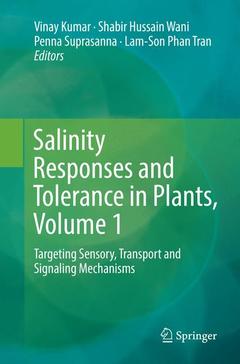Description
Salinity Responses and Tolerance in Plants, Volume 1, Softcover reprint of the original 1st ed. 2018
Targeting Sensory, Transport and Signaling Mechanisms
Coordinators: Kumar Vinay, Wani Shabir Hussain, Suprasanna Penna, Tran Lam-Son Phan
Language: English
Subjects for Salinity Responses and Tolerance in Plants, Volume 1:
Publication date: 01-2019
Support: Print on demand
Publication date: 04-2018
Support: Print on demand
Description
/li>Contents
/li>Biography
/li>Comment
/li>
Soil salinity is a key abiotic-stress and poses serious threats to crop yields and quality of produce. Owing to the underlying complexity, conventional breeding programs have met with limited success. Even genetic engineering approaches, via transferring/overexpressing a single ?direct action gene? per event did not yield optimal results. Nevertheless, the biotechnological advents in last decade coupled with the availability of genomic sequences of major crops and model plants have opened new vistas for understanding salinity-responses and improving salinity tolerance in important glycophytic crops. Our goal is to summarize these findings for those who wish to understand and target the molecular mechanisms for producing salt-tolerant and high-yielding crops. Through this 2-volume book series, we critically assess the potential venues for imparting salt stress tolerance to major crops in the post-genomic era. Accordingly, perspectives on improving crop salinity tolerance by targeting the sensory, ion-transport and signaling mechanisms are presented here in volume 1. Volume 2 will focus on the potency of post-genomic era tools that include RNAi, genomic intervention, genome editing and systems biology approaches for producing salt tolerant crops.
Dr. Vinay Kumar is an Assistant Professor at the Post-graduate Department of Biotechnology, Progressive Education Society’s Modern College of Arts, Science and Commerce, Ganeshkhind, Pune, India and a Visiting Faculty at the Department of Environmental Sciences, Savitribai Phule University, Pune, India. He obtained his Ph.D. in Biotechnology from Savitribai Phule Pune University (Formerly University of Pune) in 2009. For his Ph.D., he worked on metabolic engineering of rice for improved salinity tolerance. He has published 30 peer reviewed research/ review articles and contributed 10 book chapters in edited books published by Springer, CRC Press and Elsevier. He is a recipient of Government of India’s Science and Engineering Board, Department of Science and Technology (SERB-DST) Young Scientist Award in 2011. His current research interests include elucidating molecular mechanisms underlying salinity stress responses and tolerance in plants. His research group is engaged in assessing the individual roles and relative importance of sodium and chloride ions under salinity stress in rice and made significant contributions in elucidating the individual and additive effects of sodium and chloride ions.
Dr. Shabir H. Wani is an Assistant Professor cum Scientist at the Mountain Research Centre for Field Crops, Khudwani Sher-e-Kashmir University of Agricultural Sciences and Technology of Kashmir, Srinagar, Jammu and Kashmir, India. He has published more than 100 papers/chapters in peer reviewed journals, and books of international and national repute. He is Review Editor of Frontiers in Plant Sciences, Switzerland. He is editor of SKUAST Journal of Research, and LS: An International journal of Life Sciences. He has also edited ten books on current topics in crop improvement published by CRC press, Taylor and Francis Group, USA and Springer. His Ph.D research fetched the first prize in North zone at national level competition in India.




